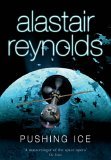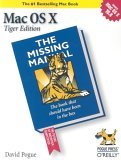While I'm catching up, here are the last three books I've read and enjoyed.

 Ray Kurzweil's The Singularity Is Near took me weeks to read, and not just because it is over 600 pages (including notes). What made it hard was its extraordinary ideas. Every page had an insight -- the nature of consciousness, blurring of human-computer boundaries, the nature of a "self" and the impact of computing power limited only by physics. My mind kept wandering over the implications -- I'd read a paragraph and then find myself dreaming up a Philip K. Dick novel.
Ray Kurzweil's The Singularity Is Near took me weeks to read, and not just because it is over 600 pages (including notes). What made it hard was its extraordinary ideas. Every page had an insight -- the nature of consciousness, blurring of human-computer boundaries, the nature of a "self" and the impact of computing power limited only by physics. My mind kept wandering over the implications -- I'd read a paragraph and then find myself dreaming up a Philip K. Dick novel.
Kurzweil starts with a simple premise: the rate of progress is accelerating exponentially, which he backs up with some convincing evidence that extends back at least as far as the discovery of fire and invention of stone tools. He then carries on logically and methodically to show why, if that's true, we're much closer than we realize to some extraordinary advances, when progress will essentially proceed at an infinite pace (the "Singularity"). I think he underestimates the complexity of many of these problems, but that would only delay some of dilemmas that we'll face. Just to take one example: Kurzweil compares individuals to the shape of a river, with the water representing the atoms that make up our physical bodies. Because every molecule in our bodies changes about once a month, Kurzweil argues, what we are is a pattern of information, like the shape of the river. Every neuron, and every other part of us, can theoretically be modeled in a computer. What happens when computers get powerful enough to host all of that information? Is it a person? Why not? If Kurzweil is right, we'll be confronting questions like that faster than we realize.


Alastair Reynolds's Pushing Ice was a bit of a mental break compared with Kurzweil's book, but it still had plenty of insights. This is the first book I've read by Reynolds, who has a Ph.D in astronomy and works for the European Space Agency. The story starts in the second half of this century and evolves around a comet-mining ship that is diverted to chase what appears to be an alien vessel racing away from the solar system. Like the last Ken MacLeod book I read, Reynolds takes minimal liberties with the laws of physics. That leads to a problem: Going anywhere interesting takes months or years in space, which leaves conflicts aboard ship to provide much of the action. There's plenty of that before anyone ever encounters an alien, assuming they'd recognize it as such. As time drags on and the chase turns involuntarily into a long-term, interstellar mission, the crew has to struggle to survive.
As always, the science in this fiction isn't strictly necessary. The same story could be told about a ship rounding the horn of Africa in the 16th century. But Reynolds obvious grasp of the science adds to the gripping read. Unlike Kurzweil's book, I devoured this in a couple of sittings.


I'm only about half-way through David Pogue's Mac OS X: The Missing Manual, but it's a skimmer anyway. I'll be popping in and out of this book for quite a while since, as I've mentioned in a previous post, we got an iMac for Christmas. Although I've used Macs once in a while while working for PC Week, I haven't used one in earnest since college, when Apple's computers ran a totally different operating system. I've been pleasantly surprised on how similar OS X is to Linux (since it has a free BSD operating system underneath) and Pogue's book does a good job of filling in some of the blanks. The author's focus, however, is aimed squarely at the non-nerd, home computer user. I'm still struggling to get my head around the way OS X manages daemons and schedules tasks, which isn't something that will keep the average home user awake at night. It's something I worry about, though. It took me a week to get a daily backup working, which I finally managed by just piggy-backing on tasks that the computer already does on a daily basis. Perhaps I should try some of the other O'Reilly books on the Mac, such as the ones geared toward people who area already familiar with Unix.
Tags: Books

Kurzweil starts with a simple premise: the rate of progress is accelerating exponentially, which he backs up with some convincing evidence that extends back at least as far as the discovery of fire and invention of stone tools. He then carries on logically and methodically to show why, if that's true, we're much closer than we realize to some extraordinary advances, when progress will essentially proceed at an infinite pace (the "Singularity"). I think he underestimates the complexity of many of these problems, but that would only delay some of dilemmas that we'll face. Just to take one example: Kurzweil compares individuals to the shape of a river, with the water representing the atoms that make up our physical bodies. Because every molecule in our bodies changes about once a month, Kurzweil argues, what we are is a pattern of information, like the shape of the river. Every neuron, and every other part of us, can theoretically be modeled in a computer. What happens when computers get powerful enough to host all of that information? Is it a person? Why not? If Kurzweil is right, we'll be confronting questions like that faster than we realize.

Alastair Reynolds's Pushing Ice was a bit of a mental break compared with Kurzweil's book, but it still had plenty of insights. This is the first book I've read by Reynolds, who has a Ph.D in astronomy and works for the European Space Agency. The story starts in the second half of this century and evolves around a comet-mining ship that is diverted to chase what appears to be an alien vessel racing away from the solar system. Like the last Ken MacLeod book I read, Reynolds takes minimal liberties with the laws of physics. That leads to a problem: Going anywhere interesting takes months or years in space, which leaves conflicts aboard ship to provide much of the action. There's plenty of that before anyone ever encounters an alien, assuming they'd recognize it as such. As time drags on and the chase turns involuntarily into a long-term, interstellar mission, the crew has to struggle to survive.
As always, the science in this fiction isn't strictly necessary. The same story could be told about a ship rounding the horn of Africa in the 16th century. But Reynolds obvious grasp of the science adds to the gripping read. Unlike Kurzweil's book, I devoured this in a couple of sittings.

I'm only about half-way through David Pogue's Mac OS X: The Missing Manual, but it's a skimmer anyway. I'll be popping in and out of this book for quite a while since, as I've mentioned in a previous post, we got an iMac for Christmas. Although I've used Macs once in a while while working for PC Week, I haven't used one in earnest since college, when Apple's computers ran a totally different operating system. I've been pleasantly surprised on how similar OS X is to Linux (since it has a free BSD operating system underneath) and Pogue's book does a good job of filling in some of the blanks. The author's focus, however, is aimed squarely at the non-nerd, home computer user. I'm still struggling to get my head around the way OS X manages daemons and schedules tasks, which isn't something that will keep the average home user awake at night. It's something I worry about, though. It took me a week to get a daily backup working, which I finally managed by just piggy-backing on tasks that the computer already does on a daily basis. Perhaps I should try some of the other O'Reilly books on the Mac, such as the ones geared toward people who area already familiar with Unix.
Tags: Books

